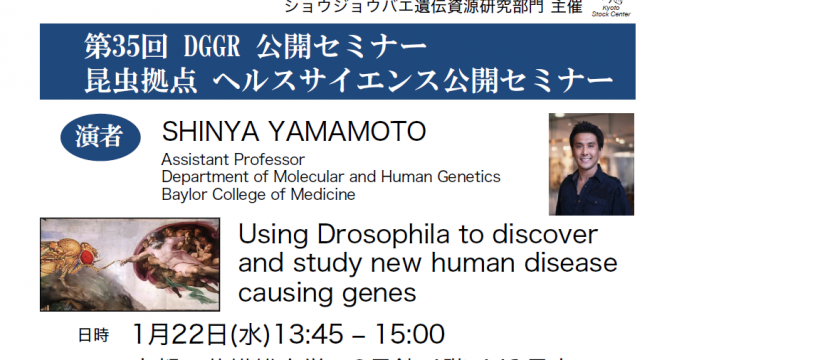Using Drosophila to discover and study new human disease causing genes
SHINYA YAMAMOTO
Assistant Professor
Department of Molecular and Human Genetics
Baylor College of Medicine
Date and Time: Wednesday 22 January 2020, 13:45 ‒ 15:00
Place: Room 441, Building2 , Matsugasaki Campus, Kyoto Institute of Technology
Many rare and undiagnosed diseases are caused by mutations in the patient’s genomic DNA. Identification of mutations responsible for these disorders can facilitate the understanding of biological functions of these genes in human biology. In the past decade, we have been using both forward and reverse genetics approaches in Drosophila melanogaster (fruit flies) in combination with state-of-the-art human genomics techniques to discover new human disease causing genes. Through sophisticated genetics tools in flies, we have been able to further study and dissect the underlying molecular mechanisms of many rare neurological diseases, which often provides new insights into more common diseases including Alzhemier’s disease and Zika virus mediated microcephaly. Opportunities for basic scientists to directly contribute to clinical and translational research are increasing globally due to establishment of collaborative consortiums such as Undiagnosed Diseases Network (UDN, USA), Rare Disease Models and Mechanisms Network (RDMM, Canada) and Initiatives for Rare and Undiagnosed Diseases (IRUD, Japan), and model organism researchers are playing a critical role in this world-wide endeavor.
References
Yamamoto et al, 2012 Cell “A drosophila genetic resource of mutants to study mechanisms underlying human genetic diseases.” PMID: 25259927
Splinter et al, 2018 N Eng J Med “Effect of Genetic Diagnosis on Patients with Previously Undiagnosed Disease.” PMID: 30304647
Wangler et al, 2014 Genetics “Model Organisms Facilitate Rare Disease Diagnosis and Therapeutic Research.” PMID: 28874452
Bellen et al., 2019 Hum Mol Genet “The fruit fly at the interface of diagnosis and pathogenic mechanisms of rare and common human diseases.” PMID: 31227826

